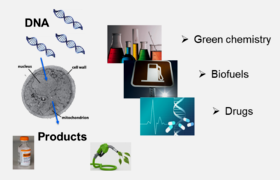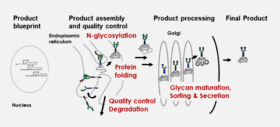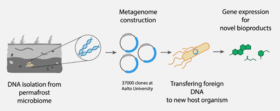Molecular biotechnology

Our research areas:
-
Engineering of yeast for production of recombinant proteins and biochemicals
-
Enzymatic production and modification of biologically-active oligosaccharides
We believe in the power of living cells used as cellular factories that can contribute to solving humanities’ grand challenges.
In all our research activities we follow synthetic biology and systems biology inspired approaches and combine them with the power of high-throughput screening and state-of-the-art analytics.

Research themes:
Bakers's yeast as a test bed:
Yeast has been used for thousands of years to make food and drink. More recently, yeast has also been scientifically well studied and used in the production of pharmaceuticals, vaccines, secondary metabolites or bioenergy. Using baker’s yeast as a working horse, we create new ways to make “tried and tested” products – however in a more efficient way as in the existing production methods.
Engineering biology: From isolated molecular components via modules to complex living systems:
In nature, the most basic active entities are proteins, which besides serving as structural elements, function as regulatory molecules or catalysts. Proteins exhibiting defined regulatory or catalytic activities can be assembled into functionally active modules, and these modules can be assembled into complex systems that can fulfill the desired tasks.
Oligosaccharide-based active ingredients:
Carbohydrates are ubiquitous molecules with very diverse functions ranging from energy source to structural elements in cells. Furthermore, certain oligosaccharides such as N-glycans have the ability to modulate the functions and properties of proteins they are attached to. However, in recent years it has become clear that oligosaccharides themselves can modulate many biological processes. Together with Valio we explore novel ways to build bioactive oligosaccharides that could be produced in an industrial scale and used as active ingredients in food applications.
Metagenomics: new functionalities from nature:
To match the ever-growing need for novel bioproducts and pharmaceuticals, metagenomics is as an alternative method for isolation of novel enzymes and pathways. In this approach all the DNA found in an environmental sample is isolated and transferred to a surrogate host for functional expression and testing. Using this method, new enzymes can be discovered.
Research group members:
Related content:
Researchers developing safe and affordable way to produce antibodies with aim of global access to treatment
New method uses yeast to grow antibodies against SARS-CoV-2 and other viruses.

Alexander Frey wants to cut health costs with specialised yeast
The Professor of Molecular biotechnology has harnessed a hardy workforce for tasks such as manufacturing cheap medicines and biofuels.










